Argo Workflows on EKS
Argo Workflows is an open source container-native workflow engine for orchestrating parallel jobs on Kubernetes. It is implemented as a Kubernetes CRD (Custom Resource Definition). As a result, Argo workflows can be managed using kubectl and natively integrates with other Kubernetes services such as volumes, secrets, and RBAC.
The example demonstrates how to use Argo Workflows to assign jobs to Amazon EKS.
- Use Argo Workflows to create a spark job.
- Use Argo Workflows to create a spark job through spark operator.
- Trigger Argo Workflows to create a spark job based on Amazon SQS message insert event by using Argo Events.
Code repo for this example.
Prerequisites:
Ensure that you have the following tools installed locally:
Deploy
To provision this example:
git clone https://github.com/awslabs/data-on-eks.git
cd data-on-eks/schedulers/terraform/argo-workflow
region=<your region> # set region variable for following commands
terraform init
terraform apply -var region=$region #defaults to us-west-2
Enter yes at command prompt to apply
The following components are provisioned in your environment:
- A sample VPC, 2 Private Subnets and 2 Public Subnets
- Internet gateway for Public Subnets and NAT Gateway for Private Subnets
- EKS Cluster Control plane with one managed node group
- EKS Managed Add-ons: VPC_CNI, CoreDNS, Kube_Proxy, EBS_CSI_Driver
- K8S Metrics Server, CoreDNS Autoscaler, Cluster Autoscaler, AWS for FluentBit, Karpenter, Argo Workflows, Argo Events, Kube Prometheus Stack, Spark Operator and Yunikorn Scheduler
- K8s roles and rolebindings for Argo Workflows and Argo Events

Validate
The following command will update the kubeconfig on your local machine and allow you to interact with your EKS Cluster using kubectl to validate the deployment.
Run update-kubeconfig command:
aws eks --region eu-west-1 update-kubeconfig --name argoworkflows-eks
List the nodes
kubectl get nodes
# Output should look like below
NAME STATUS ROLES AGE VERSION
ip-10-1-0-189.eu-west-1.compute.internal Ready <none> 10m v1.29.15-eks-473151a
ip-10-1-0-240.eu-west-1.compute.internal Ready <none> 10m v1.29.15-eks-473151a
ip-10-1-1-135.eu-west-1.compute.internal Ready <none> 10m v1.29.15-eks-473151a
List the namespaces in EKS cluster
kubectl get ns
# Output should look like below
NAME STATUS AGE
argo-events Active 7m45s
argo-workflows Active 8m25s
spark-team-a Active 5m51s
default Active 25m
karpenter Active 21m
kube-node-lease Active 25m
kube-prometheus-stack Active 8m5s
kube-public Active 25m
kube-system Active 25m
spark-operator Active 5m43s
yunikorn Active 5m44s
Access Argo Workflow WebUI
To access Argo Workflow WebUI in your browser, open another terminal and execute the command below:
kubectl port-forward service/argo-workflows-server -n argo-workflows 2746:2746
Sample output:
Forwarding from 127.0.0.1:2746 -> 2746
Forwarding from [::1]:2746 -> 2746
Handling connection for 2746
...
In your browser, access the WebUI via http://localhost:2746/
The initial username is admin. The login token is autogenerated and you can get it by running the following command:
ARGO_TOKEN=$(argo auth token)
echo $ARGO_TOKEN
Sample output:
Bearer k8s-aws-v1.aHR0cHM6Ly9zdHMudXMtd2VzdC0yLmF...
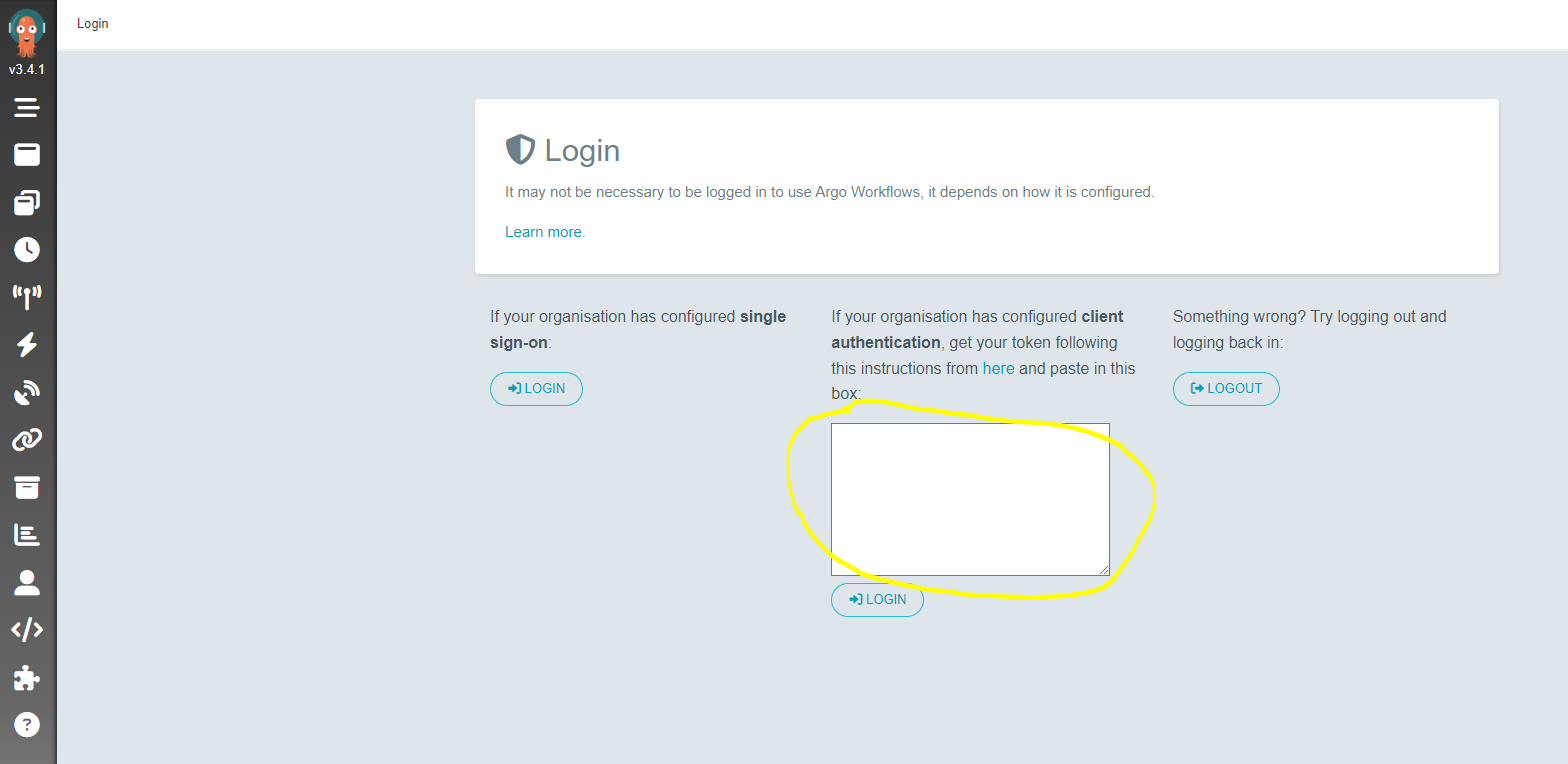
Submit Spark Job with Argo Workflow
Export EKS API from terraform output
eks_api_url=https://ABCDEFG1234567890.yl4.eu-west-2.eks.amazonaws.com
cat workflow-examples/argo-spark.yaml | sed "s/<your_eks_api_server_url>/$eks_api_url/g" | kubectl apply -f -
kubectl get wf -n argo-workflows
NAME STATUS AGE MESSAGE
spark Running 8s
You can also check the workflow status from Web UI
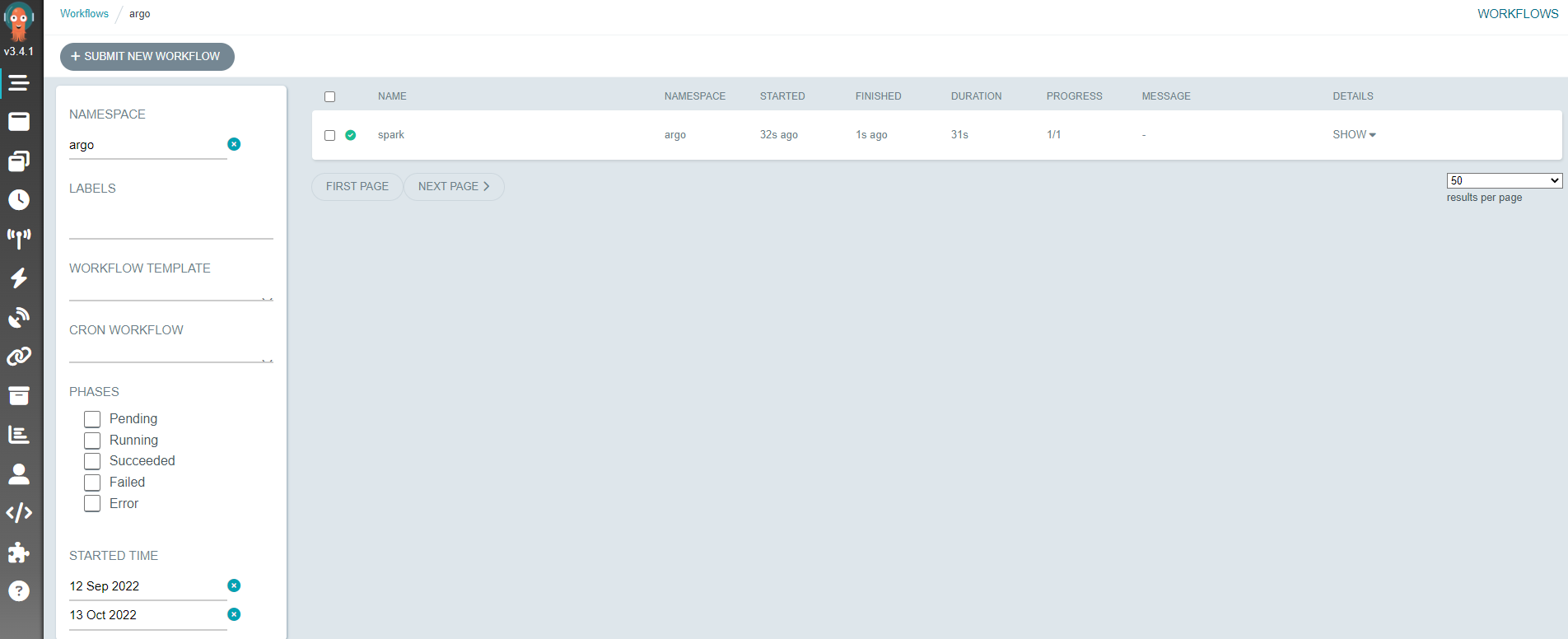
Submit Spark Job with Spark Operator and Argo Workflow
kubectl apply -f workflow-examples/argo-spark-operator.yaml
kubectl get wf -n argo-workflows
NAME STATUS AGE MESSAGE
spark Succeeded 3m58s
spark-operator Running 5s
The workflow status from web UI
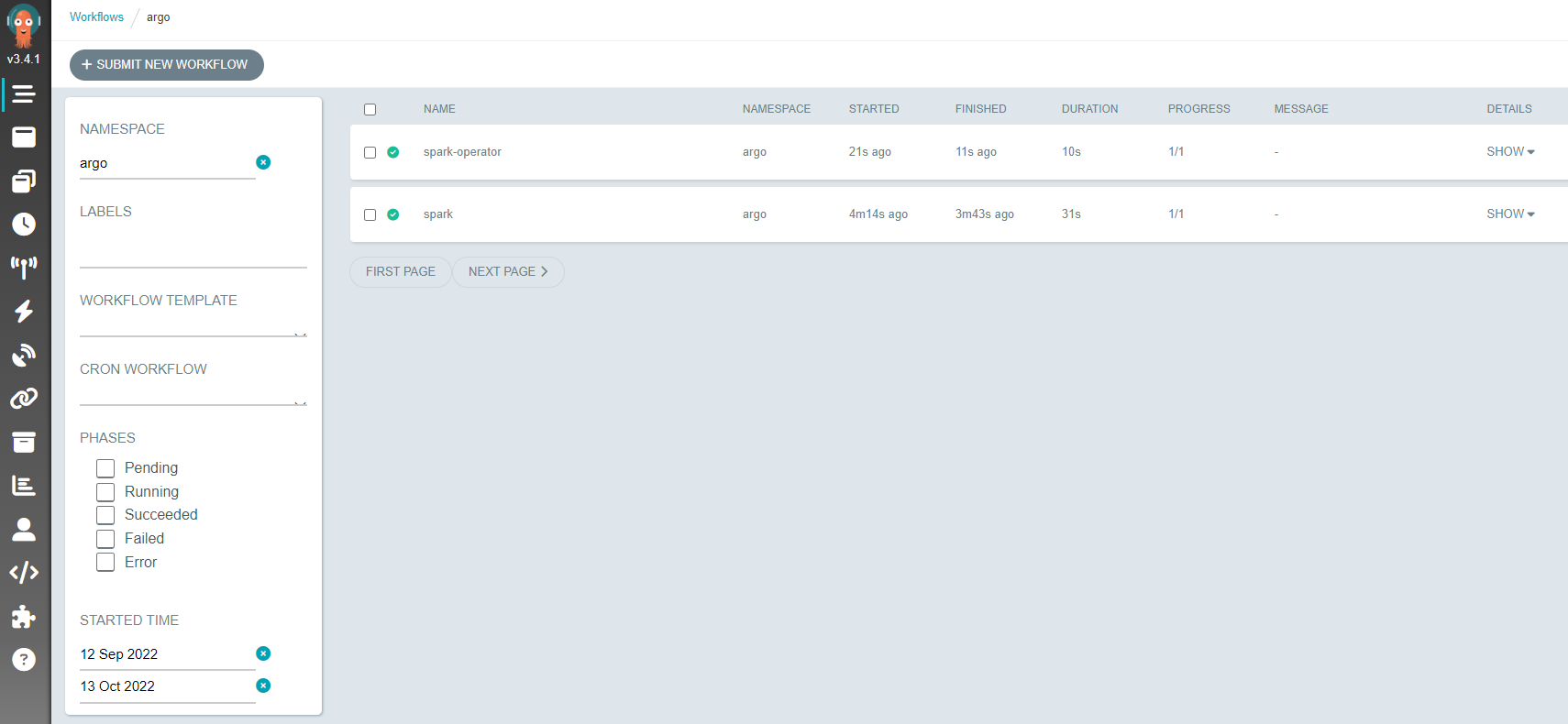
Trigger a workflow to create a spark job based on SQS message
Install eventbus which is for event transmission in argo events
kubectl apply -f argo-events-manifests/eventbus.yaml
Deploy eventsource-sqs.yaml to link with external SQS
In this case, we configure a EventSource to license to the queue test1 in region us-east-1. The eventsource is capable of monitoring events across regions, so the Amazon EKS cluster and Amazon SQS queue don’t need to be located in the same Region.
queue_name=test1
region_sqs=us-east-1
cat argo-events-manifests/eventsource-sqs.yaml | sed "s/<region_sqs>/$region_sqs/g;s/<queue_name>/$queue_name/g" | kubectl apply -f -
Let's create that queue in your account.
# create a queue
queue_url=$(aws sqs create-queue --queue-name $queue_name --region $region_sqs --output text)
# get your queue arn
sqs_queue_arn=$(aws sqs get-queue-attributes --queue-url $queue_url --attribute-names QueueArn --region $region_sqs --query "Attributes.QueueArn" --output text)
template=`cat argo-events-manifests/sqs-accesspolicy.json | sed -e "s|<sqs_queue_arn>|$sqs_queue_arn|g;s|<your_event_irsa_arn>|$your_event_irsa_arn|g"`
aws sqs set-queue-attributes --queue-url $queue_url --attributes $template --region $region_sqs
Deploy sensor-rbac.yaml and sensor-sqs-spark-crossns.yaml for triggering workflow
kubectl apply -f argo-events-manifests/sensor-rbac.yaml
cd workflow-examples
Update the variables in Shell script and execute
./taxi-trip-execute.sh
Update YAML file and run the below command
kubectl apply -f sensor-sqs-sparkjobs.yaml
Verify argo-events namespace
kubectl get all,eventbus,EventSource,sensor,sa,role,rolebinding -n argo-events
# Output should look like below
NAME READY STATUS RESTARTS AGE
pod/argo-events-controller-manager-bfb894cdb-26qw7 1/1 Running 0 18m
pod/aws-sqs-crossns-spark-sensor-zkgz5-6584787c47-zjm9p 1/1 Running 0 44s
pod/aws-sqs-eventsource-544jd-8fccc6f8-w6ssd 1/1 Running 0 4m45s
pod/eventbus-default-stan-0 2/2 Running 0 5m21s
pod/eventbus-default-stan-1 2/2 Running 0 5m13s
pod/eventbus-default-stan-2 2/2 Running 0 5m11s
pod/events-webhook-6f8d9fdc79-l9q9w 1/1 Running 0 18m
NAME TYPE CLUSTER-IP EXTERNAL-IP PORT(S) AGE
service/eventbus-default-stan-svc ClusterIP None <none> 4222/TCP,6222/TCP,8222/TCP 5m21s
service/events-webhook ClusterIP 172.20.4.211 <none> 443/TCP 18m
NAME READY UP-TO-DATE AVAILABLE AGE
deployment.apps/argo-events-controller-manager 1/1 1 1 18m
deployment.apps/aws-sqs-crossns-spark-sensor-zkgz5 1/1 1 1 44s
deployment.apps/aws-sqs-eventsource-544jd 1/1 1 1 4m45s
deployment.apps/events-webhook 1/1 1 1 18m
NAME DESIRED CURRENT READY AGE
replicaset.apps/argo-events-controller-manager-bfb894cdb 1 1 1 18m
replicaset.apps/aws-sqs-crossns-spark-sensor-zkgz5-6584787c47 1 1 1 44s
replicaset.apps/aws-sqs-eventsource-544jd-8fccc6f8 1 1 1 4m45s
replicaset.apps/events-webhook-6f8d9fdc79 1 1 1 18m
NAME READY AGE
statefulset.apps/eventbus-default-stan 3/3 5m21s
NAME AGE
eventbus.argoproj.io/default 5m22s
NAME AGE
eventsource.argoproj.io/aws-sqs 4m46s
NAME AGE
sensor.argoproj.io/aws-sqs-crossns-spark 45s
NAME SECRETS AGE
serviceaccount/argo-events-controller-manager 0 18m
serviceaccount/argo-events-events-webhook 0 18m
serviceaccount/default 0 18m
serviceaccount/event-sa 0 16m
serviceaccount/operate-workflow-sa 0 53s
NAME CREATED AT
role.rbac.authorization.k8s.io/operate-workflow-role 2023-07-24T18:52:30Z
NAME ROLE AGE
rolebinding.rbac.authorization.k8s.io/operate-workflow-role-binding Role/operate-workflow-role 52s
Test from SQS
Send a message from SQS: {"message": "hello"}
aws sqs send-message --queue-url $queue_url --message-body '{"message": "hello"}' --region $region_sqs
Argo Events would capture the message and trigger Argo Workflows to create a workflow for spark jobs.
kubectl get wf -A
# Output should look like below
NAMESPACE NAME STATUS AGE MESSAGE
argo-workflows aws-sqs-spark-workflow-hh79p Running 11s
Run the command below to check spark application driver pods and executor pods under spark-team-a namespace.
kubectl get po -n spark-team-a
# Output should look like below
NAME READY STATUS RESTARTS AGE
event-wf-sparkapp-tcxl8-driver 1/1 Running 0 45s
pythonpi-a72f5f89894363d2-exec-1 1/1 Running 0 16s
pythonpi-a72f5f89894363d2-exec-2 1/1 Running 0 16s
See the SQS workflow status in web UI
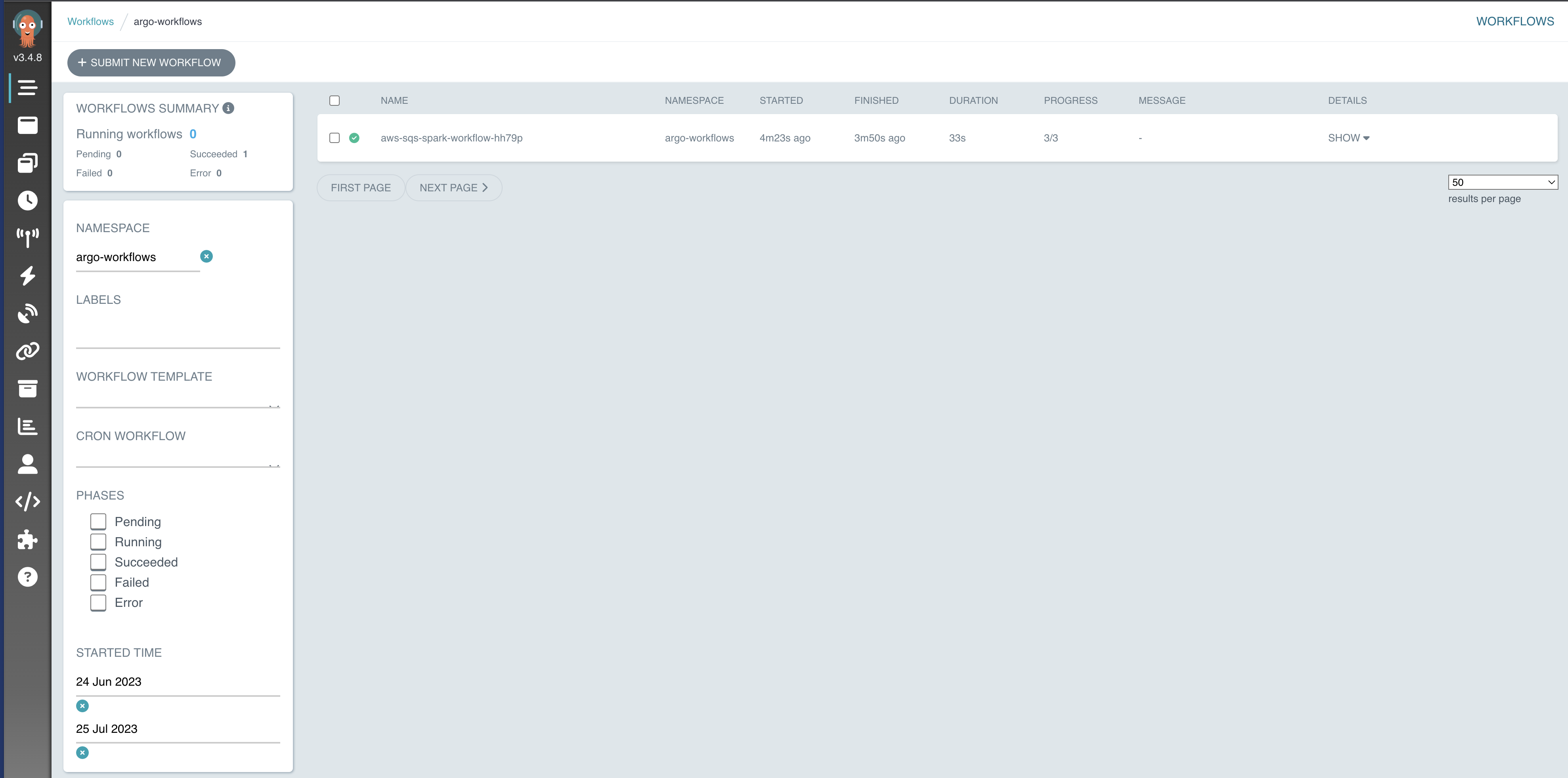
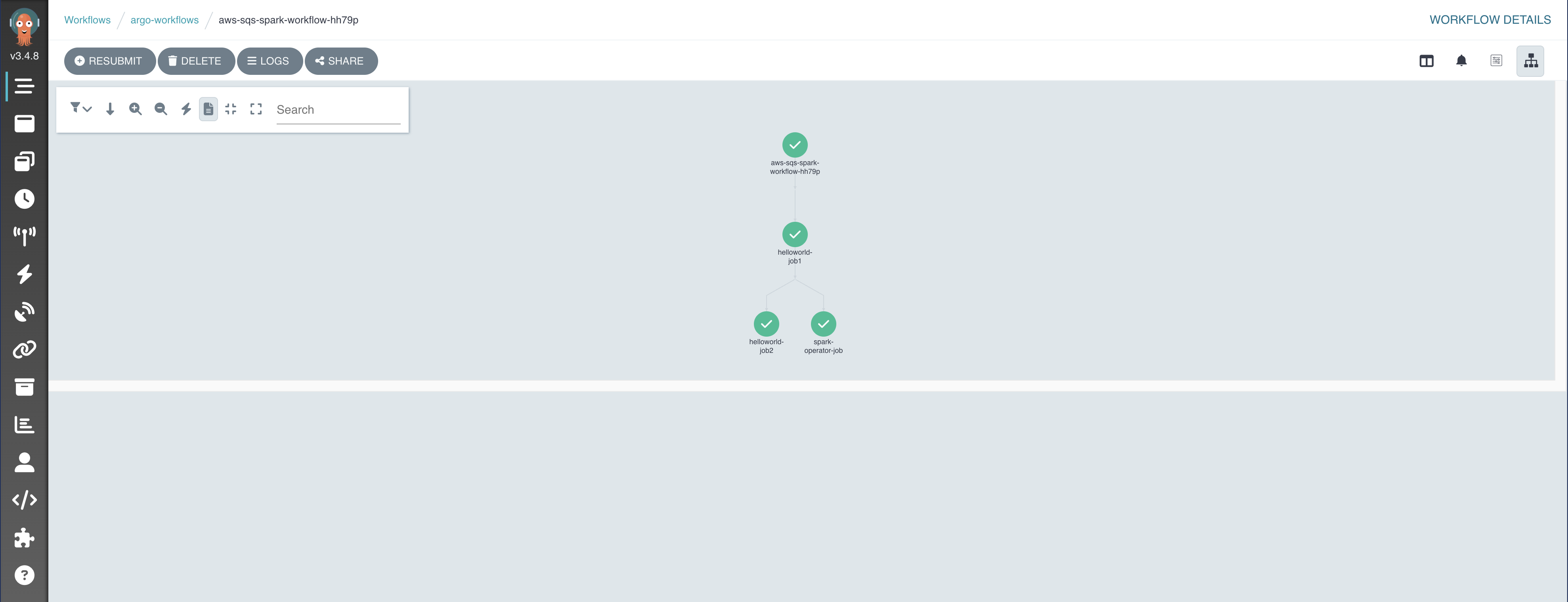
Destroy
To teardown and remove the resources created in this example:
kubectl delete -f argo-events-manifests/.
./cleanup.sh